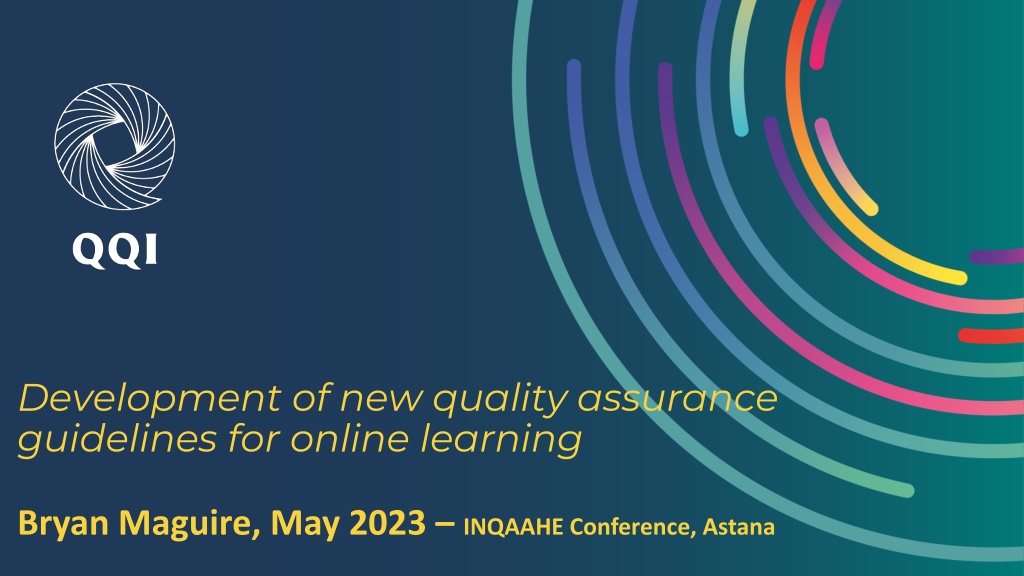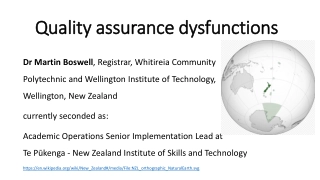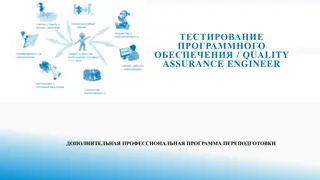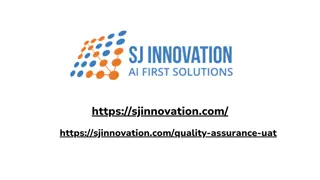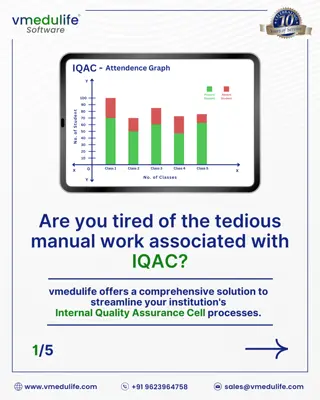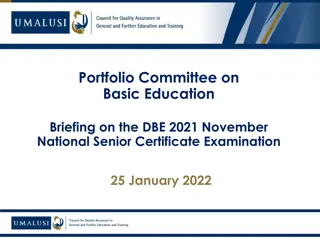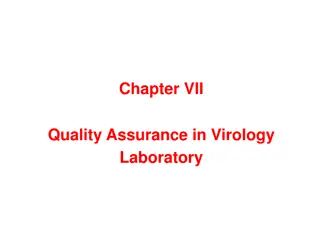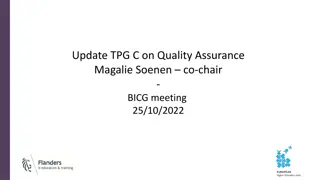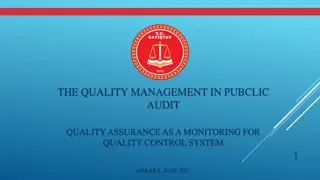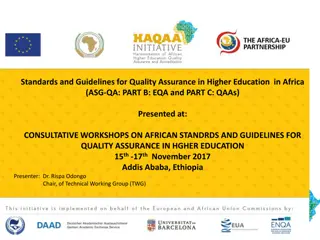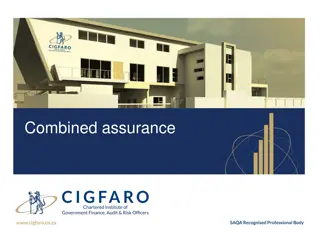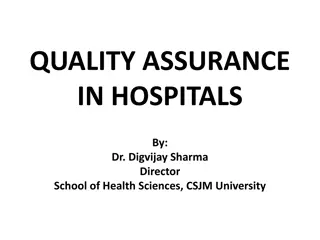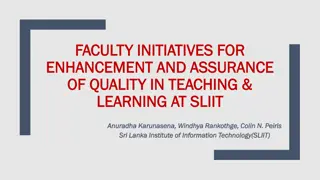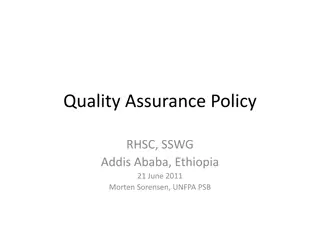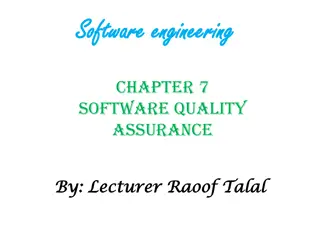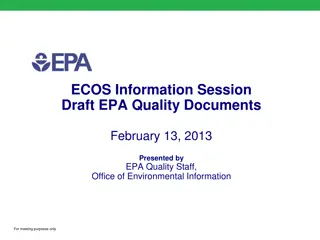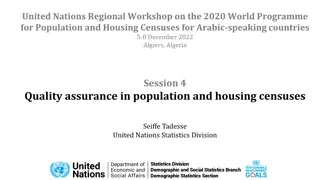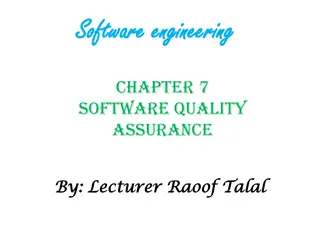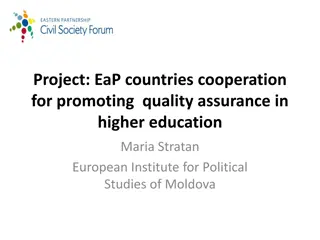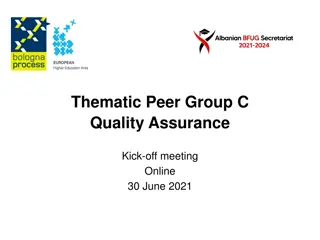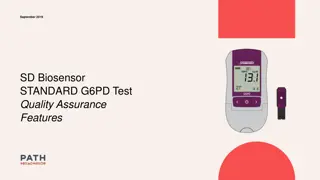Development of new quality assurance guidelines for online learning
Explore the development of new quality assurance guidelines for online learning, the role of Quality and Qualifications Ireland in maintaining national qualifications, and the principles and framework of quality assurance in Irish higher education institutions. Understand the continuous improvement approach, transparency, and responsibilities of providers in ensuring quality education. Stay informed about the monitoring, reporting, cyclical reviews, and upcoming initiatives in the quality assurance processes.
Download Presentation

Please find below an Image/Link to download the presentation.
The content on the website is provided AS IS for your information and personal use only. It may not be sold, licensed, or shared on other websites without obtaining consent from the author. Download presentation by click this link. If you encounter any issues during the download, it is possible that the publisher has removed the file from their server.
E N D
Presentation Transcript
Development of new quality assurance guidelines for online learning Bryan Maguire, May 2023 INQAAHE Conference, Astana
Quality and Qualifications Ireland Established under Qualifications and Quality Assurance (Education and Training) Act 2012 to: Maintain, develop and promote the National Framework of Qualifications Make awards, delegate power to make awards, determine standards Facilitate qualifications recognition (ENIC-NARIC) Monitor and review effectiveness of teriary providers quality assurance, publish reviews Publish Irish Register of Qualifications, providers and programmes associated with QQI and NFQ (www.irq.ie) Implement an International Education Mark for HE and English language education
Providers of Higher Education 7 established Universities 5 newly merged Technological Universities Specialised colleges Independent sector - quality assured through QQI programme validation, QQI make awards Funding and strategic planning by Higher Education Authority (HEA
Principles of Quality Assurance Goal: Continuous improvement, enhanced transparency Primary responsibility lies with providers. QA requires planning, resources and commitment - a process not an event! Quality systems are context dependent. Ownership and understanding of a provider quality system by its management and staff are crucial
HE Quality Assurance Framework in Ireland Quality Assurance Guidelines published by QQI, following consultation Quality assurance procedures established by HEIs and approved by QQI* Quality assurance activities of HEIs monitored by QQI Annual quality report from each HEI, with national synthesis Periodic quality dialogue meeting with each HEI Cyclical reviews of institution s QA Thematic analyses National reports (for example, sector s response to pandemic conditions) Programme validation and periodic re-validation in private HEIs (<10% of total) Focused review of institution (non-routine) Soon: International education mark authorisation
QA Guidelines Core Sector specific (e.g.) Public universities, private HEIs Education and Training Boards language schools Topic specific (e.g.) Apprenticeship Blended learning - 2018
QA and blended learning Long history of blended and digital learning initiatives National Institute for Distance Learning - DCU (1990s) Hibernia College (private teacher education) 2004 Individual programmes, enhancement projects Digital transformation - National Forum for the Enhancement of Teaching and Learning in Higher Education Changing technologies, changing demands Dealt with under general principles and methods of QA Topic specific QA Guidelines 2018 The digital pivot during Covid emergency remote learning The Impact of COVID-19 Modifications to Teaching, Learning and Assessment in Irish Further Education and Training and Higher Education
QA guidelines for online learning Request for tenders - March 2022 Appointment of DCU team June 2022 comprehensive review of the contemporary literature an online survey managed by QQI four online listening sessions with Irish providers, educators, and learners October-November 2022 Conference presentations Draft approved for public consultation March 2023 Consultation closes June 9th2023 Publication of guidelines autumn 2023
Scope and title QA guidelines for providers of programmes supported by digital education Blended, hybrid and online programmes Supported by glossary of terms
Sections Introduction Context Structure Domains and procedures Applying the guidelines
Introduction Why do we need these guidelines? What is digital education? To whom do these guidelines apply? What is the purpose, scope and relevance?
Context How is the education landscape changing? What are the common features of blended learning programmes? What are the common features of online learning programmes? Why guidelines rather than minimum standards?
Structure of guidelines Contexts with scoping statement Organisational context Programme context Learner experience context Each context has a number of domains Each domain has good practice statement set of indicators
Organisational context - scope focuses on strategic and institution-wide aspects of managing quality for programmes supported by digital education. It establishes whether appropriate procedures are in place for strategy, policies, regulations and administrative processes, finance, infrastructure, resources, training and professional development, institutional support, strategic collaboration, and partnerships, and for addressing issues related to learners studying outside of Ireland.
Organisational context - domains Strategy, management and implementation plans Policies, regulations and administrative processes Finance, infrastructure and resources Staff Training, Professional Development and Institutional Support Strategic partners and collaboration Learners outside Ireland
Staff Training, Professional Development and Institutional Support Good Practice Statement: The availability of staff training and professional development and the level of institutional support for teachers, and for those who support teaching and provide crucial administrative services, builds capacity, and enables best practice for blended, hybrid and/or online learning provision
Good Practice Statement: The availability of staff training and professional development and the level of institutional support for teachers, and for those who support teaching and provide crucial administrative services, builds capacity, and enables best practice for blended, hybrid and/or online learning provision
Good practice is supported and reflected by: 4.1 The strategies and processes for the appointment, induction, training, professional development, and appraisal arrangements for teachers and for those who support teaching are appropriate and specific to blended, hybrid and/or online learning contexts. 4.2 There is a planned approach to the appointment of (or access to) specialist staff to support the provider s blended, hybrid and/or online learning strategy, including people with teaching, technical and professional expertise appropriate to integrating new digital technologies in the learning experience. 4.3 Subject expertise and academic qualifications remain important criteria in recruiting appropriate staff but also include competencies required, for example, in designing and facilitating programmes supported by digital education, with an understanding of the pedagogical differences between study modes.
Special consideration for online 4.5 Staff engaged in teaching programmes supported by digital education should participate in appropriate training and professional development and have access to mentoring from more experienced colleagues. Online Programmes: For online learning programmes, staff must either demonstrate previous experience of teaching online or participate in appropriate induction, training and professional development before they facilitate courses, and have access to ongoing support from more experienced colleagues.
Programme context - scope focuses on the programme as a whole and the approval and validation processes and whether the level, duration, and volume of credit are appropriate, the degree to which learning outcomes are responsive to changing work, industry or community needs and the study mode is fit-for- purpose. It establishes whether appropriate procedures are in place to follow the principles of good practice for blended, hybrid and/or online learning provision with overall coherence and constructive alignment between the learning outcomes and the curriculum design, including the teaching methods, learner interactivity, learning materials and resources, assessment and feedback practices, and evaluation strategies.
Programme context - domains Programme outcomes Approval and programme validation processes Learning and curriculum design Learning resources and materials Assessment and feedback practices Evaluation and continuous improvement
Learner experience context - scope focuses on the learner, the choices they make and whether the support and development services and related [digital] resources designed to promote high levels of engagement, learner success and wellbeing are fit-for-purpose. It establishes whether procedures are in place to ensure learners are adequately informed about the programme and aware of both online and offline learning support and development services available to them, with a particular focus on supporting study readiness, equality of opportunity and positive outcomes for learners based on learner- centred and good practice principles for blended, hybrid and/or online learning provision.
Learner experience context Thinking about study Learning support and development Equality of opportunity Learning experience and outcomes
Applying the guidelines How can providers use these guidelines? How might different providers use the guidelines? How can providers document evidence of their good practice?
Next steps Consultation still open international input welcome Discussions still happening Rolling out implementation at system level Awareness building and dissemination Incorporation into local HEI QA procedures Monitoring adoption through annual quality reports and quality dialogue meetings QQI validation of online programmes and providers Review of uptake and impact of guidelines
